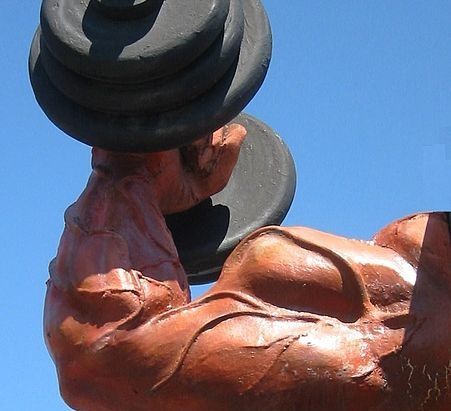Some might argue it started with the Vikings, while others would probably maintain that it is universal to all men. But whenever it started, the tough guys of Jutland have certainly come up with some pretty bizarre contests over the years to weed out the wimps from the warriors, ingeniously utilising all kinds of props to get their result.
They might have long ago settled down to a relatively peaceful, agrarian existence after those tempestuous centuries as lords of the seas, conquering foreign lands near and far, but the farming folk of northern Jutland have never quite tired of strongman contests.
In the early part of the last century, however, it would appear that they relied as much on the strength of their cats’ insides as they did the stamina of their menfolk.
Thors of Thy
In 1929, an anonymous photographer managed to capture the contests of strength held across a stream in the northwest Jutland region of Thy, a name that coincidentally enough is believed to derive from the old Norse word for Thor, the Viking god of war and might.
They called their contest ‘røk’rs kastru’, a butchering of the term ‘at rykke i kattestrud’, which translates literally as ‘to pull a cat’s gut’. And that’s exactly what they did: two men would attach the same piece of cat’s intestine around their waist and kneel down on opposing sides of a river bank, facing away from the water. The winner was the one who managed to pull his opponent down into the river first.
The contests fetched an audience, albeit sparse. Seventy years later, a TV broadcast of a similar contest of strength enabled interested parties to watch from the comfort of their home as the seven-time winner of the title ‘The World’s Strongest Man’, Jutland’s very own Georg Olesen, stamped his name in the Guinness Book of Records by successfully pulling an 188-tonne jumbo jet 21.5 metres at Copenhagen Airport.
Sadly since then, Denmark’s mightiest man has become more associated with the mistreatment of animals, after allegations led to a police investigation into his involvement in Aarhus’s murky underworld of dog fighting.
Tarnished by Tarnow
In November 2002, Poland’s strongest man, Flemming Tarnow, laid claim to being the rightful owner of the title Georg Olesen had become synonymous with, challenging his rival to a test of strength. This was to be held at the somewhat inauspicious venue of a furniture warehouse in Kolding – also in Jutland – with one of the categories being to pull a 20-tonne truck with a single finger!
The contest failed to materialise, however, despite the heavy investment made by the furniture company hosting it. It seems Tarnow had failed to return his rental car and was apprehended and detained by police shortly before the contest was due to be held. The world of strongmen, apparently, is one that often finds itself walking rather close to the thin blue line of the law.
Although pulling one’s rival into a river by means of a cat gut no longer attracts the attention of the local tourist board, the people of Thisted in Thy are proud to invite visitors along for a contest of another sort: animal racing. Every year the town hosts an event where farmyard animals such as pigs and geese battle it out on the racecourse. Perhaps Olesen could bring his dog.














